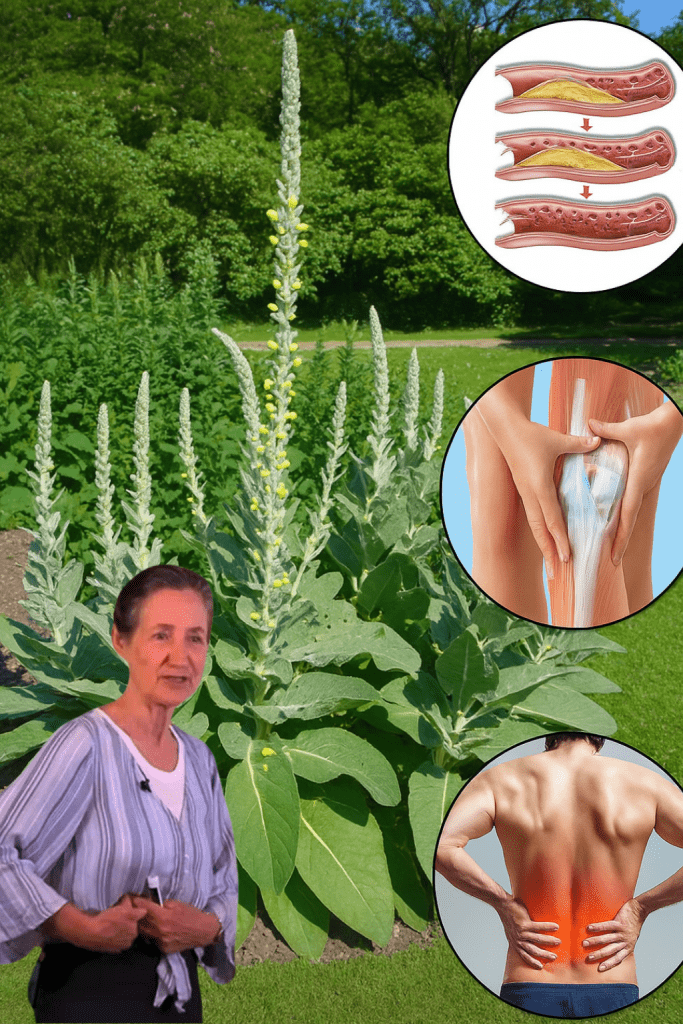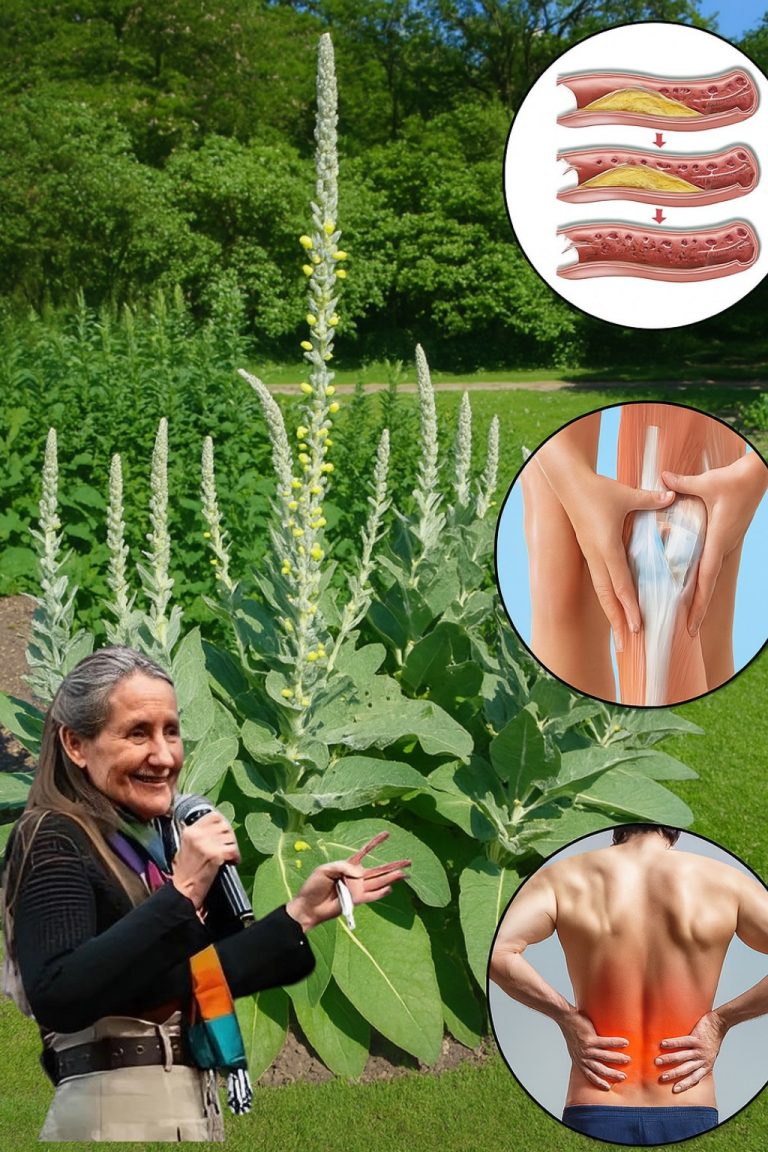Imagine stumbling upon a towering plant with soft, velvety leaves and vibrant yellow flower spikes in a forgotten corner of your garden. This is Common Mullein (Verbascum thapsus), a biennial herb that’s far more than a roadside weed. Known as Woolly Mullein or Flannel Plant, this unassuming herb has been a cornerstone of herbal medicine for centuries, offering a treasure trove of health benefits and practical uses. From soothing respiratory ailments to healing wounds and even serving as a natural fire starter, mullein’s versatility is nothing short of extraordinary. Dive into this exploration of mullein’s magic and discover why this herb deserves a starring role in your wellness journey.

🌬️ A Breath of Relief: Mullein’s Respiratory Magic
Mullein’s reputation as a respiratory hero is well-earned. Its leaves and flowers are packed with expectorant properties that help clear mucus from the lungs, making it a go-to remedy for coughs, bronchitis, asthma, and chest congestion. The herb’s anti-inflammatory compounds soothe irritated airways, providing relief from sore throats and persistent, dry coughs. Whether you’re battling a seasonal cold or managing chronic respiratory issues, mullein offers a gentle yet powerful solution.
Preparing mullein tea is a simple way to harness its benefits. Steep 1-2 teaspoons of dried leaves or flowers in hot water for 10-15 minutes, strain carefully to remove fine hairs, and sip up to three cups daily. For a more potent option, mullein tinctures or syrups deliver concentrated relief, easing breathing and calming inflammation with every dose.
👂 Earache Ease: Mullein’s Soothing Touch
Ear infections can be agonizing, especially for children, but mullein flower oil offers a time-tested remedy. Infused with antimicrobial and anti-inflammatory properties, this oil reduces pain and fights infection naturally. A few drops of warmed mullein oil applied to the affected ear can work wonders, providing comfort without the need for harsh chemicals.
To make your own mullein oil, fill a jar with fresh or dried mullein flowers and cover them with olive oil. Let the mixture infuse in a warm, sunny spot for 2-4 weeks, then strain and store in a dropper bottle. This golden elixir is a must-have for any natural medicine cabinet, offering quick relief for earaches and minor infections.
💪 Anti-Inflammatory Powerhouse
Mullein’s benefits extend beyond the respiratory system. Rich in antioxidants and compounds like verbascoside, it boasts potent anti-inflammatory effects that can alleviate joint pain, muscle aches, and swelling. Whether you’re dealing with arthritis or post-workout soreness, mullein’s soothing properties provide natural relief.
The herb’s antiviral and antibacterial qualities also make it a formidable ally against infections like colds and flu. By calming irritated mucous membranes, mullein helps your body fight off illness while easing discomfort, making it a versatile addition to your wellness routine.
🩺 Skin Savior: Healing Wounds and Soothing Irritations
Mullein’s velvety leaves aren’t just pleasing to the touch—they’re a boon for skin health. Applied externally, mullein-infused oil or poultices made from fresh or dried leaves can treat burns, cuts, sores, and bruises. Its astringent and soothing properties also make it effective for managing skin conditions like eczema, rashes, and psoriasis.
For minor wounds, apply mullein oil directly to the affected area to promote healing and reduce inflammation. For deeper skin irritations, a poultice made by crushing fresh leaves can draw out impurities and calm redness. This natural approach to skincare harnesses mullein’s gentle power, leaving your skin feeling nourished and restored.
🍵 Digestive Harmony
Mullein’s benefits aren’t limited to external applications—it also supports digestive health. Mullein tea has long been used to ease issues like diarrhea, constipation, and hemorrhoids. By soothing the gut lining and reducing inflammation, the herb promotes a balanced digestive system, helping you feel lighter and more comfortable.
To prepare mullein tea for digestive relief, follow the same recipe as for respiratory support: steep 1-2 teaspoons of dried mullein in hot water, strain, and drink up to three cups daily. Its mild flavor and calming effects make it an easy addition to your daily routine.
😌 Natural Pain Relief
Mullein’s mild analgesic properties offer a natural way to manage pain. From headaches to joint discomfort, the herb can help take the edge off without relying on over-the-counter medications. Its anti-inflammatory effects work in tandem with its pain-relieving qualities, providing holistic relief for everyday aches and pains.
🔥 Beyond Medicine: Mullein’s Practical Uses
Mullein’s versatility extends far beyond the medicine cabinet. In ancient times, its soft leaves and stems were used as wicks for oil lamps and candles, their fuzzy texture making them ideal for holding a flame. The plant’s velvety leaves also served as natural insulation, tucked into shoes or clothing to keep people warm in harsh winters.
Dried mullein stalks, often called “nature’s torches,” were used as fire starters or carried as portable light sources. Even today, outdoor enthusiasts prize mullein for its ability to ignite quickly, making it a valuable tool for camping and survival scenarios.
🐝 A Gift to Pollinators and the Planet
Mullein isn’t just good for humans—it’s a lifeline for pollinators. Its vibrant yellow flowers attract bees, butterflies, and other beneficial insects, supporting biodiversity in gardens and wild spaces. As a hardy plant, mullein thrives in poor soils, helping to stabilize them and prevent erosion. By planting mullein in your garden, you’re not only adding a striking visual element but also contributing to a healthier ecosystem.

🌱 How to Incorporate Mullein into Your Life
Ready to experience mullein’s wonders for yourself? Here are two simple ways to get started:
Mullein Tea for Respiratory and Digestive Health
Ingredients: 1-2 teaspoons dried mullein leaves or flowers, 1 cup hot water.
Instructions: Steep the herb in hot water for 10-15 minutes. Strain carefully to remove fine hairs, which can irritate the throat. Drink up to 2-3 cups daily for relief.
Tip: Add a touch of honey for a soothing, flavorful twist.
Mullein Oil for Earaches and Skin Care
Ingredients: Fresh or dried mullein flowers, olive oil.
Instructions: Place flowers in a jar, cover with olive oil, and let infuse for 2-4 weeks in a warm, sunny spot. Strain and store in a dropper bottle. Use 2-3 warm drops for earaches or apply to skin for healing.
Tip: Store in a cool, dark place to maintain potency.
⚠️ Precautions for Safe Use
While mullein is generally safe, a few precautions ensure you get the most out of its benefits:
Always strain mullein tea thoroughly to remove fine hairs, which can irritate the throat.
If you’re allergic to plants in the Scrophulariaceae family, avoid mullein.
Consult a healthcare provider before using mullein, especially if you have chronic conditions or are pregnant.
🌟 Why Mullein Deserves Your Attention
Common mullein is more than a plant—it’s a testament to nature’s ingenuity. Its ability to heal, soothe, and serve in countless ways makes it a standout in the world of herbal medicine. Whether you’re sipping mullein tea to ease a cough, applying its oil to heal a wound, or marveling at its towering presence in your garden, this herb invites you to connect with the natural world in a profound way.
By embracing mullein, you’re tapping into centuries of wisdom and unlocking a world of wellness possibilities. Its gentle yet effective properties make it a must-have for anyone seeking natural solutions to everyday health challenges. So, why not let mullein work its magic in your life? Plant it, brew it, or simply admire it—mullein’s gifts are waiting for you to discover.
